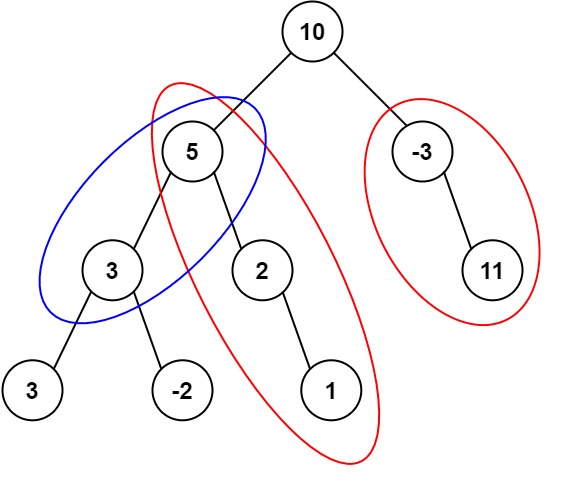Problem
Given the root of a binary tree and an integer targetSum, return the number of paths where the sum of the values along the path equals targetSum.
The path does not need to start or end at the root or a leaf, but it must go downwards (i.e., traveling only from parent nodes to child nodes).
Example 1:

Input: root = [10,5,-3,3,2,null,11,3,-2,null,1], targetSum = 8
Output: 3
Explanation: The paths that sum to 8 are shown.
Example 2:
Input: root = [5,4,8,11,null,13,4,7,2,null,null,5,1], targetSum = 22
Output: 3
Constraints:
The number of nodes in the tree is in the range
[0, 1000].-10^9 <= Node.val <= 10^9-1000 <= targetSum <= 1000
Solution (Java)
/*
* Definition for a binary tree node.
* public class TreeNode {
* int val;
* TreeNode left;
* TreeNode right;
* TreeNode() {}
* TreeNode(int val) { this.val = val; }
* TreeNode(int val, TreeNode left, TreeNode right) {
* this.val = val;
* this.left = left;
* this.right = right;
* }
* }
*/
public class Solution {
private int count = 0;
public int pathSum(TreeNode root, int targetSum) {
if (root == null) {
return 0;
}
helper(root, targetSum, 0);
pathSum(root.left, targetSum);
pathSum(root.right, targetSum);
return count;
}
public void helper(TreeNode node, int targetSum, long currSum) {
currSum += node.val;
if (targetSum == currSum) {
count++;
}
if (node.left != null) {
helper(node.left, targetSum, currSum);
}
if (node.right != null) {
helper(node.right, targetSum, currSum);
}
}
}
Solution (Javascript)
/**
* Definition for a binary tree node.
* function TreeNode(val, left, right) {
* this.val = (val===undefined ? 0 : val)
* this.left = (left===undefined ? null : left)
* this.right = (right===undefined ? null : right)
* }
*/
/**
* @param {TreeNode} root
* @param {number} targetSum
* @return {number}
*/
var pathSum = function(root, targetSum) {
let count = 0
const map = {0: 1}
const aux = (node, current) => {
if (!node) {
return
}
const next = current + node.val
if (map[next - targetSum] > 0) {
count += map[next - targetSum]
}
map[next] = (map[next] || 0) + 1
aux(node.left, current + node.val)
aux(node.right, current + node.val)
map[next] -= 1
}
aux(root, 0)
return count
};
Explain:
nope.
Complexity:
- Time complexity : O(n).
- Space complexity : O(n).